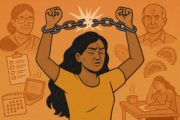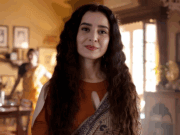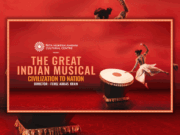Who knew that naming our kids would cause us to worry that we were choosing an identity for them?

I’m a Punjabi Sikh American, and my husband, Johann, is a Norwegian-German Lutheran American. We wanted to honour both of our cultures and religions when we had children, and giving them ethnic names was high on our priority list. So, we named our son Anders in honour of Johann’s background and our daughter Anjali in honour of mine. What we struggled with, however, was whether we were labeling our kids and choosing cultural identities for them based on their names.
Everything I’ve read on the topic indicates that mixed kids appreciate diversity and are not diminished by being exposed to all aspects of their backgrounds and celebrating their differences. What I like about this idea is that more and more kids are embracing the totality of their backgrounds rather than choosing to identify with just one side or the other. And that’s exactly what we strive for. No parent wants their child to feel marginalized on both sides or like they have to identify with one ethnicity over the other. In order to combat those feelings, I'm sharing some tools that we have started implementing within our own family.
1. Encourage Discussion about Our Cultural and Religious Backgrounds: Both Johann and I talk about our religious and cultural upbringings by telling stories from when we were little and by taking our children to the Sikh Gurdwara Temple and to church, and by exposing them to our ethnic languages and countries. We have dance parties to bhangra music and eat Indian food while also singing Norwegian bedtime songs and saying nightly prayers. While our kids are still young (aged four and two years), we are very cognizant of how important it is now and in the future to continue talking about what an important role our backgrounds play in who we are today, and to openly and honestly answer their questions on these topics.
 2. Create a Family Identity: We like to celebrate our religious and cultural events as a family unit, so the kids can see both of us embracing all aspects of our backgrounds. We don't just identify as Indian, or Norwegian, or American. We are all of those things ("Punj-weg-ican," anyone?). There are many layers to our religious and cultural differences, but we want our children to know that we love each other and love the differences in our multicultural family as well.
2. Create a Family Identity: We like to celebrate our religious and cultural events as a family unit, so the kids can see both of us embracing all aspects of our backgrounds. We don't just identify as Indian, or Norwegian, or American. We are all of those things ("Punj-weg-ican," anyone?). There are many layers to our religious and cultural differences, but we want our children to know that we love each other and love the differences in our multicultural family as well.
3. Attend Cultural and Religious Events: Luckily, our families are a huge help with this. Whenever there’s a Sikh or Indian holiday, we celebrate it. For example, at Diwali, one of our family members always has a party, including fireworks and loads of great tandoori chicken. And, whenever Christmas, Easter, or Norwegian Syttende Mai (Constitution Day) rolls around, we explain the significance and lessons learned. Anders and Anjali love getting presents and going to parties, but they also love the sense of community that these events bring with them.
 4. Don’t Label Them: This practice goes back to our original worry of whether we were categorizing our children as being either Indian American or Norwegian American by giving them ethnic names. Deep down, I may consider them to be Indian and Johann may see them as Norwegian, but ultimately, what we’ve realized is that their personalities are developing based on what we encourage and embrace — not the origins of their names or our internal viewpoints. Anders doesn’t perceive himself as not Indian because he has a Norwegian name; in fact, he’s my little one who loves bhangra music and eating Indian sweets more than anything. And Anjali, though she’s young, loves Norwegian meatballs and fish, and going to Ikea (had to throw that in for my Scandinavian friends!). Their personalities are evolving every day, and we want to encourage their exploration without putting any sort of label on them.
4. Don’t Label Them: This practice goes back to our original worry of whether we were categorizing our children as being either Indian American or Norwegian American by giving them ethnic names. Deep down, I may consider them to be Indian and Johann may see them as Norwegian, but ultimately, what we’ve realized is that their personalities are developing based on what we encourage and embrace — not the origins of their names or our internal viewpoints. Anders doesn’t perceive himself as not Indian because he has a Norwegian name; in fact, he’s my little one who loves bhangra music and eating Indian sweets more than anything. And Anjali, though she’s young, loves Norwegian meatballs and fish, and going to Ikea (had to throw that in for my Scandinavian friends!). Their personalities are evolving every day, and we want to encourage their exploration without putting any sort of label on them.
The bottom line is that, as long as we continue exposing them to our religions and cultures, our children will embrace parts of each religion and culture to create their own identities. And, really, when you’re thinking about how you want your child to grow and the type of people you want them to be, being someone who honours all aspects of their heritage is a pretty good foundation!
Images courtesy of Amrith Aakre
Amrith Aakre
Author
Amrith K. Aakre is a fitness nut, avid reader, and clings to her youth by going out dancing occasionally. Amrith’s goal is to communicate her thoughts on all topics from the perspective of a busy mom, wife, and attorney who is trying to find a space in the world.


















































































































